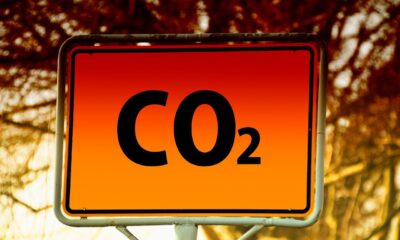Impact Investing
“Green Taxation”: Essential and Incentive Lever for the Ecological Transition?
In a report on the ecological transition of the 2018 finance bill in France, the Senate estimated that the increase in the carbon tax had been “above all implemented in a logic of budgetary efficiency, for the benefit of the general budget of the State.” Germany improved its environmental performance, setting ambitious goals of “climate neutrality” by 2045, and “negative emissions” from 2050.

The energy transition and the fight against global warming are major challenges for the future of the planet and humanity. To achieve this, we must reduce greenhouse gas emissions, promote renewable and economical energy, and encourage economic and social actors to adopt more responsible behavior.
Taxation is an essential lever for directing the choices of consumers, producers and investors towards greener and more sustainable solutions.
Read more about the importance of taxation in the fight to reduce pollution, and find the most important financial news of the day with the Born2Invest mobile app.
Taxation abroad and in France and in 2023 to accelerate the transition
In France, ecological taxation is mainly based on the internal consumption tax on energy products (TICPE), which applies to fuels, domestic fuel oil and natural gas. This tax includes a carbon component, which increases each year based on a CO2 price set by law.
In 2023, this price should reach 90 euros per tonne of CO2 (86 euros in the aviation sector, which requires different quotas), which would translate into an increase of 9 cents per liter of gasoline and 10 cents per liter of diesel. The objective is to discourage the use of fossil fuels and encourage the use of less polluting modes of transport, such as cycling, carpooling or public transport.
Measures criticized because they provide insufficient environmental incentives
The TICPE is, however, criticized for its social impact, because it weighs more on low-income households and rural areas, where the car is often essential. To compensate for this injustice, the government has put in place support measures, such as the energy check, the conversion bonus, or the energy transition tax credit (CITE), the latter having been eliminated since January 1 , 2021 to be replaced by the “energy transition bonus” – “MaPrimeRénov”.
These devices aim to help households reduce their energy bill, heat better or acquire a cleaner vehicle. However, these measures are considered insufficient by certain observers, who call for a more comprehensive and fairer reform of ecological taxation.
In a special report on the ecological transition of the 2018 finance bill in France, the Senate had already estimated that the increase in the carbon tax had been “above all implemented in a logic of budgetary efficiency, for the benefit of the general budget of the State” to partly finance the cost of the tax credit for competitiveness and employment (CICE), and not in a logic of “ecological incentives”.
Furthermore, taxes with an explicitly ecological aim, making it possible to combat air and water pollution, or aimed at limiting waste production, have very low rates of return in France. However, a tax that is too low does not have a sufficiently dissuasive effect to direct taxpayers towards virtuous and more environmentally friendly practices. It is then assimilated to an “output” tax, because it does not fulfill its environmental objective.
Conversely, a tax that is too high can lead to significant economic risks for the competitiveness of businesses and the purchasing power of the French, particularly those on the lowest incomes.
In addition, the OECD has often denounced the fact that “black taxation” constitutes an obstacle to the ecological transition: in fact, the subsidies which encourage the consumption and production of non-renewable fossil energies represent 40 to 70 billion euros per year within the OECD, two thirds of which for oil.
Fuels used in agriculture and fishing, for example, are largely exempt from tax in all OECD countries. According to a report from the Court of Auditors in France (2013), around thirty exemptions have been identified, such as reduced rates on taxes for fuels used by taxis, certain boats or agricultural products, such as tax exemption for natural gas producers and refining companies or even aid for service stations in isolated areas.
Examples of success abroad
Abroad, other countries have implemented tax incentive systems for the energy transition and the fight against global warming. For example, Sweden introduced a carbon tax on fossil fuels in 1991, which today amounts to around 120 euros per tonne of CO2. This tax made it possible to reduce CO2 emissions by 26% between 1990 and 2018, while supporting economic growth. Sweden has also implemented tax exemptions or reductions for sectors exposed to international competition or for renewable energies.
Another example is Canada, which in 2018 adopted a law on pricing pollution caused by greenhouse gases. This law provides for a floor price for CO2 which increases each year until it reaches CA$50 (around 34 euros) per tonne of CO2 in 2022. This price applies to provinces which have not implemented their own system of carbon pricing, such as a tax or an emissions trading market. The law also provides a mechanism for redistributing income generated by carbon pricing to households and businesses, in order to mitigate its economic impact.
For its part, Germany continued to improve its environmental performance, setting ambitious goals of “climate neutrality” by 2045, and “negative emissions” from 2050. Furthermore, the United States – greater world economy – has made progress in reducing several environmental pressures by decoupling them from economic growth, while maintaining one of the highest GDP per capita in the world.
Portugal, for its part, was able to decouple several environmental pressures from economic growth between 2013 and 2019, playing a leading role in the approval of the European climate law, and it adopted the Portuguese framework law on climate in 2021, aiming for carbon neutrality by 2050.
Failure situations too
Costa Rica is known for its success in reversing deforestation and pursuing a growth model based on the sustainable use of its environmental resources, but energy consumption and the increase in greenhouse gases have greatly affected it. increased over the last decade, ruining its efforts in this direction.
Furthermore, in its 15th and 16th plenary sessions – on March 31, 2023 – ECOSOC (Economic and Social Council on International Cooperation in Tax Matters), under the aegis of the United Nations, considered ways to make tax cooperation more inclusive and effective international framework in the current context of multiple crises, rising costs of living, rising inequalities and climate change.
During the second round table organized on the climate and “taxation as a political lever to advance the energy transition”, a World Bank official (Mr. Heine) defended the merits of a “carbon tax” . In addition to increasing the tax base, an ecotax of $75 per tonne of CO2 would help support weakened national health systems, he argued. For the expert from the World Resources Institute of Mexico, the carbon tax alone cannot, however, be enough and must be accompanied by a gradual elimination of fossil fuel subsidies and implicit carbon pricing in excise taxes. existing on fuels.
But the establishment of a “carbon tax” is not always easy or achievable everywhere, as two speakers at these ECOSOC sessions raised:
– speaking by videoconference from his country, South Africa, Mr. Christopher Axelson, Chief Director of the Economic Analysis of Taxation Unit within the National Treasury, spoke of the difficult implementation of a “carbon tax”, in a complicated social context, even though its amount, 9 dollars per tonne, is very far from the 75 dollars recommended by Mr. Heine. “ Extensive consultations have been carried out with industry and the public. This has not been easy in a country where economic growth has been weak and unemployment is exceptionally high ,” he conceded. Any tax policy that could restrict growth or harm employment has generated strong popular opposition in South Africa: ” we have had to make a lot of adjustments to meet the needs of particular industries .”
– For its part, Romania reacted strongly to the introduction of a “carbon tax”, considering the “bar” to be crossed much too high for it. After Covid-19, the war in Ukraine, inflation, new high energy prices, the country finds itself “facing a real dilemma”. To reduce its “dirty fossil” consumption, Romania sees no solution outside of institutions like the UN, and introducing a “carbon tax” would therefore be suicide for a small economy such as its own, argued the Romanian delegation.
Recent tax advances in G20 countries
After two days of negotiations in Venice, the finance ministers of the G20 countries – the 19 richest countries and the European Union – gave the political green light to the implementation, from 2023, of a major tax reform global, a step which had to be further confirmed, in October, by the formal agreement of the heads of state of the G20 and, at the global level, by the rallying of a handful of countries still refractory, including, in Europe, the Ireland, a known tax haven. Until now opposed to the project, Saint Vincent and the Grenadines, a tax haven located in the Caribbean, announced its late joining the working group under the aegis of the OECD, bringing together 132 of the 139 member countries of the “inclusive framework “.
The politically validated reform is based on two pillars:
- the creation of a global minimum tax of at least 15% for companies with more than 750 million euros in turnover;
- the redistribution of 20 to 30% of the surplus profits of the hundred largest and most profitable multinationals, for the benefit of so-called “market” countries, in which they do business without having a presence there. Among them we find all the GAFA (Google, Apple, Facebook, Amazon). The global minimum tax alone should bring back 150 billion dollars (126 billion euros) per year to state coffers.
Conclusion
These examples show that there are different ways of designing tax incentives for the energy transition and the fight against global warming. There is no single solution or optimal model, but the specificities of each country, its energy resources, its social needs and its international commitments must be taken into account. We must also ensure that ecological taxation is accepted by citizens and economic actors, by guaranteeing its transparency, readability and justice. It is under these conditions that taxation can be an effective and legitimate tool to accelerate the transition to a greener and more sustainable world.
__
(Featured image by Marek Piwnicki via Pexels)
DISCLAIMER: This article was written by a third party contributor and does not reflect the opinion of Born2Invest, its management, staff or its associates. Please review our disclaimer for more information.
This article may include forward-looking statements. These forward-looking statements generally are identified by the words “believe,” “project,” “estimate,” “become,” “plan,” “will,” and similar expressions. These forward-looking statements involve known and unknown risks as well as uncertainties, including those discussed in the following cautionary statements and elsewhere in this article and on this site. Although the Company may believe that its expectations are based on reasonable assumptions, the actual results that the Company may achieve may differ materially from any forward-looking statements, which reflect the opinions of the management of the Company only as of the date hereof. Additionally, please make sure to read these important disclosures.
First published in ActuFINANCE. A third-party contributor translated and adapted the article from the original. In case of discrepancy, the original will prevail.
Although we made reasonable efforts to provide accurate translations, some parts may be incorrect. Born2Invest assumes no responsibility for errors, omissions or ambiguities in the translations provided on this website. Any person or entity relying on translated content does so at their own risk. Born2Invest is not responsible for losses caused by such reliance on the accuracy or reliability of translated information. If you wish to report an error or inaccuracy in the translation, we encourage you to contact us.

-

 Biotech1 week ago
Biotech1 week agoBiotech Booster: €196.4M Fund to Accelerate Dutch Innovation
-

 Business5 hours ago
Business5 hours agoThe TopRanked.io Weekly Affiliate Marketing Digest [The Top VPN Affiliate Programs Roundup]
-

 Crypto1 week ago
Crypto1 week agoBitcoin Traders Bet on $140,000: Massive Bets until September
-

 Crypto2 weeks ago
Crypto2 weeks agoCaution Prevails as Bitcoin Nears All-Time High
























